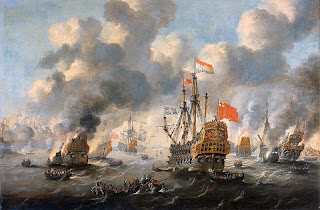On this day…..100
years ago, the Dreadnought battleship HMS
Vanguard sank in Scapa Flow in Orkney after a series of explosions. Of the 845
men aboard, only two survived.
Although the First World War was
still raging, the most likely explanation for the sinking is thought to be an
accidental explosion in the ship’s magazine. Certainly it sank almost
immediately.
Nor was this an isolated incident.
On 26 November 1914, a series of explosions ripped through the battleship HMS Bulwark as it was moored in the
Medway (pictured). The ship was lifted out of the water then fell back in a thick cloud of
smoke. There were only a dozen survivors from the crew of 750.
It being war-time, not many details
emerged, but a court of inquiry heard that shells aboard were not stored
according to regulations, and concluded that the probable cause of the disaster
was that cordite charges, kept by a boiler room bulkhead, overheated.
For more, see A Disastrous History of Britain.



